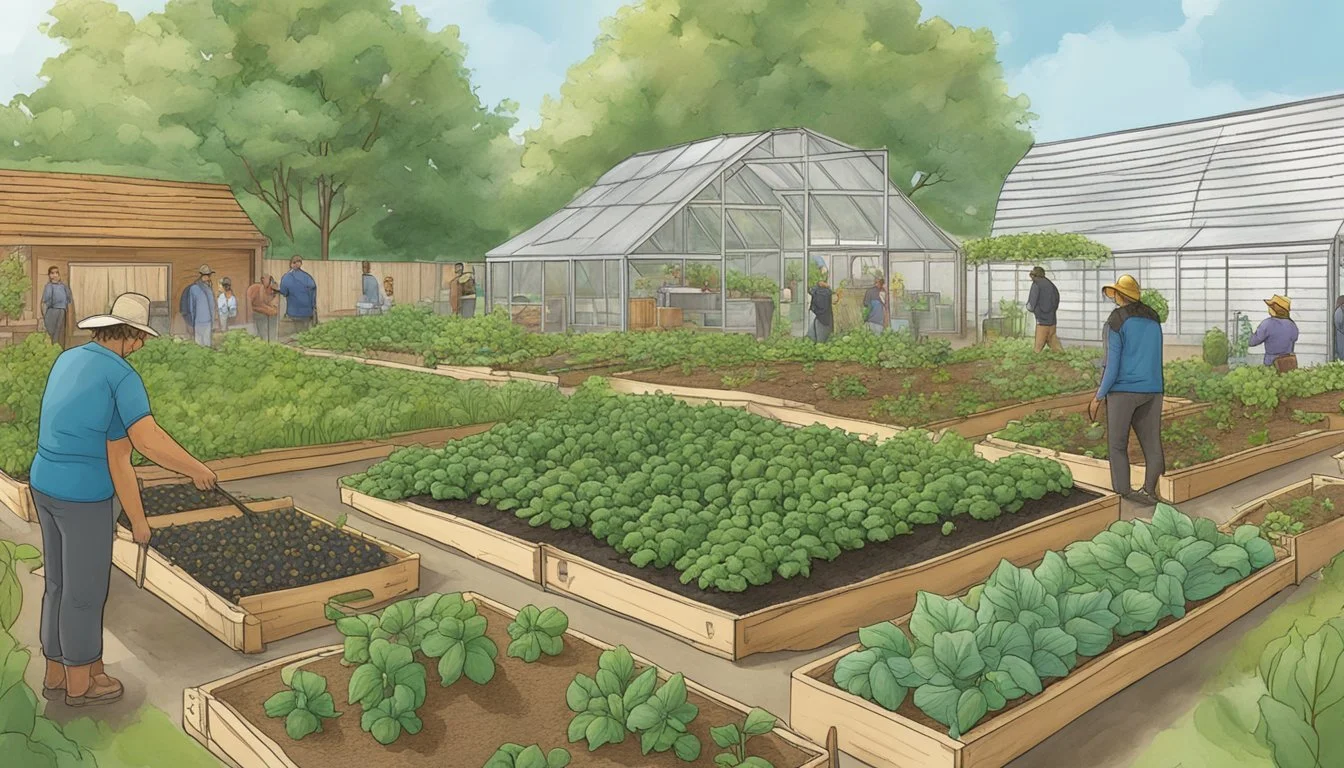Farming Grants New Jersey
Unlocking Opportunities for Garden State Agriculturists
Farming in New Jersey benefits from a variety of grants aimed at supporting agriculture, conservation, and rural development. These grants are tailored to meet specific objectives such as enhancing market opportunities, fostering sustainable practices, and providing financial relief to farm and food workers. State initiatives like the New Jersey Wine Industry Project Grants and the Junior Breeder Loan Fund exemplify targeted support for agricultural development within the state.
Eligible individuals and organizations in New Jersey may access funds for different purposes, ranging from improving market presence to adopting organic farming practices. For instance, the Farm and Food Workers Relief Grant Program offers financial assistance to ease the burdens of industry workers, whereas the Value Added Producer Grants focus on expanding the farmers' reach in the market by adding value to their products. Understanding and utilizing these grants can significantly impact the agricultural landscape by promoting growth, sustainability, and resilience in New Jersey's farming communities.
Understanding Grants in New Jersey
New Jersey offers a variety of grants designed to support the state's agriculture sector, providing financial assistance for conservation, sustainable practices, and rural development. These grants are crafted to enhance the economic viability of existing farm operations and promote agricultural innovation.
Overview of Grant Types
The New Jersey Department of Agriculture administers several types of grants. These include, but are not limited to:
Conservation Grants: Aimed at preserving soil quality and ensuring water conservation.
Sustainable Agriculture Grants: Such as those offered by the Sustainable Agriculture Research and Education (SARE) program, focusing on innovative research and education.
Value-Added Producer Grants: These grants support farmers in creating higher-value products.
Specialty Crop Block Grants: Aimed at boosting the competitiveness of specialty crops.
Eligibility and Requirements
Eligibility criteria can vary based on the specific grant. Generally, New Jersey farmers must:
Demonstrate a need for assistance in their existing operations.
Meet the objectives set forth by the Notice of Funding Availability.
Comply with state regulations and Circular 07-05-OMB guidelines.
Prospects for funding also often depend on matching funds or cost-sharing agreements as part of the grant requirements.
Grant Application Process
Applying for a grant in New Jersey typically involves the following steps:
Notification: Applicants should look for a Notice of Funding Availability posted by the New Jersey Department of Agriculture or other relevant agencies.
Proposal Submission: Submit a comprehensive application, detailing how the grant will be used in line with stated goals.
Review: Applications are assessed for their merit and alignment with grant objectives.
Agreements: Successful applicants will enter into grant agreements or agency contracts formalizing the terms of support.
Farmers and producers in New Jersey are encouraged to visit the Department of Agriculture’s website for up-to-date information and guidelines on available grants and application processes.
Types of Available Grants
New Jersey offers a variety of grants tailored to support the agricultural sector, focusing on development, environmental stewardship, and educational endeavors. These grants are pivotal for enhancing farming practices, conserving the environment, and fostering knowledge growth within the agricultural community.
Agricultural Development Grants
Specialty Crop Block Grants and Specialty Crop Multi-State Program (SCMP) Grants are two key funding sources designed to boost the competitiveness of specialty crops. These grants support a range of activities, from marketing and promotion to research and development, benefiting crops like fruits, vegetables, nuts, and nursery crops.
New Jersey's wine industry also benefits from targeted support through New Jersey Wine Industry Project Grants. These initiatives are intended to promote vineyard sustainability and the production of high-quality wine within the state, helping New Jersey vineyards to thrive.
Environmental Stewardship Grants
Entities such as the Northeast Organic Farming Association offer Mini-Grants for projects that improve resilience in food systems infrastructure. Additionally, Soil and Water Conservation Grants provide resources for conservation efforts, crucial for maintaining a balance between successful farming practices and environmental health.
The state also tackles invasive species through the Spotted Lanternfly Grants, aimed at controlling and eradicating the spotted lanternfly, an insect harmful to various crops, thus protecting New Jersey's agricultural prosperity.
Education and Research Grants
Sustainable Agriculture Research and Education (SARE) Grants support innovative projects that enhance sustainability in agriculture. These grants fund research, education, and extension projects that work towards building more sustainable farming systems.
Furthermore, when disasters strike, Disaster Assistance programs come into play, offering financial support for farmers and educational entities to recover and continue their important work in agriculture education and research.
Resources for New and Beginning Farmers
New and beginning farmers in New Jersey have access to a variety of resources designed to support their agrarian ventures. These resources range from educational programs to financial assistance, aiming to facilitate a successful start in the agricultural sector.
Training and Mentorship Programs
Farm Link Program: This initiative connects inexperienced farmers with established entities to gain practical knowledge. It encompasses training in both farming techniques and business management, often through online and in-person classes. Northeast Organic Farming Association of New Jersey (NOFA-NJ) offers mini-grants for education in organic practices, further supporting upcoming agricultural enthusiasts.
Access to Land and Capital
Access to Land: Through programs like the New Jersey Farmland Preservation Program, aspiring farmers can find opportunities to implement their business plans on accessible land. This step is crucial for individuals to transition from theoretical knowledge to practical application.
Capital & Financial Assistance:
Farm Loans: Through Farmers.gov, beginning farmers, including young farmers and veterans, can find tailor-made loan opportunities. For instance, USDA's Microloan Program offers up to $50,000 in loans with a simplified process, primarily aimed at new entrants to the farming community.
Conservation Programs: With various NOFA and federal initiatives, farmers receive support for sustainable practices that also aid in financial stability.
Grants (NOFA): Announcement of funding opportunities, or NOFA, by the NJDA, provides crucial information on grants available to farmers in the state.
Farm Credit East: This organization provides financial services, including credit and loans, essential for covering startup and operational costs for new farmers in the Northeast.
By leveraging these programs, beginning farmers in New Jersey are better positioned to overcome the initial barriers to successful farming.
Financing Farm Operations
In New Jersey, financing for farm operations is primarily available through loans and credit options, while risk management can often be addressed through various insurance programs. These financial tools are designed to support the fiscal stability and growth of farm businesses throughout the state.
Farm Loans and Credit
Farm operations in New Jersey can access a variety of loans and agricultural credit services specifically tailored to support their needs. Farm loans may cover the purchase of a new farm or the ongoing operational expenses. Here are key programs and services that provide such financial support:
Farm Service Agency (FSA) Loans: The USDA Farm Service Agency offers loans for farm ownership, operations, and emergencies.
Farm Credit East (AgEnhancement Program): A regional cooperative that extends credit and financial services to agriculture in the Northeast, including New Jersey.
New Jersey Junior Breeder Loan Fund: This program aids in financing for young individuals engaged in farming.
Each loan program comes with its specific requirements and terms, which should be thoroughly reviewed by the prospective borrower.
Insurance and Risk Management
Risk management is crucial for the protection against the loss of agricultural products due to unpredictable events. Farmers can safeguard their investments in New Jersey through:
Crop Insurance: Financially protects against the loss of their crops due to natural disasters or the loss of revenue due to declines in the prices of agricultural commodities.
Farm and Food Workers Relief Grant Program: Offers financial assistance to workers affected by COVID-19.
New Jersey Risk Management and Crop Insurance Education: Dedicated to providing education on risk management and crop insurance options.
Insurance products are available from a range of providers and can be customized to meet the needs of different farm operations. It's essential for farmers to assess their risks and choose appropriate coverage levels.
Support for Organic and Sustainable Practices
New Jersey demonstrates a strong commitment to environmental stewardship through initiatives that promote organic farming and sustainable agricultural practices. These initiatives focus on soil health, the adoption of conservation practices, and support from entities such as the Natural Resources Conservation Service (NRCS).
Organic Farming Initiatives
The Northeast Organic Farming Association of New Jersey (NOFA NJ) has been a vocal supporter of organic farming since 1985. It advocates for organic food systems and provides resources to farmers looking to adopt organic practices. Meanwhile, the Organic Initiative, part of the NRCS, offers financial assistance to implement conservation practices that are consistent with organic production.
Key Programs:
NOFA NJ Support: Education and advocacy for organic farmers
NRCS Organic Initiative: Financial assistance for organic certification compliant practices
Sustainable Farm Management
In pursuit of sustainable agriculture, New Jersey offers programs like the Sustainable Agriculture Research and Education (SARE) and the Environmental Quality Incentives Program (EQIP). Both programs promote sustainable farm management by offering grants and guidance to help implement practices that benefit the environment while maintaining productive agricultural operations.
Key Components:
SARE: Research grants for advancing sustainable innovations in agriculture
EQIP: Financial and technical assistance to agricultural producers to implement structural and management conservation practices that optimize environmental benefits
Innovation and Development in Agriculture
Agriculture in New Jersey is experiencing a significant transformation, propelled by grants that encourage research and innovation. These efforts are designed to foster technological advancements and implement strategies that contribute to a sustainable and economically viable agricultural sector.
Grants for Research and Innovation
The Spotted Lanternfly Grants support projects aimed at controlling this invasive species, which threatens the state's agriculture. Farmers and researchers can also access funding through the Sustainable Agriculture Research and Education (SARE) program, which emphasizes innovation in agriculture, including gleaning initiatives.
Research and development grants, such as those from the USDA and state-specific opportunities like the Farm and Food Workers Relief Grant Program, allocate resources for innovation that can lead to improved agricultural practices and outcomes. Collaboration between entities such as the New Jersey Commission on Science, Innovation and Technology (CSIT) and the New Jersey Economic Development Authority (NJEDA) underscores the importance of synergy in agricultural advancement.
Grant Program Focus Area Funding Entity SARE Sustainable farming practices USDA Spotted Lanternfly Pest control SADC Farming Opportunities Broad agricultural support NJEDA, CSIT
Technological Advancements in Farming
New Jersey actively invests in technological developments within the agricultural industry. The Specialty Crop Multi-State Program (SCMP) Grants and the Federal State Marketing Improvement Program (FSMIP) are instrumental in supporting technological innovations that enhance the quality and marketing of specialty crops.
To further amplify impact, the state's collaboration with entities like the CSIT enables the strategic utilization of grants for startups focused on food security through technological innovation. This includes, but is not limited to, up to $750,000 in funding from the NJEDA for new solutions in food and agriculture under CSIT's management. These collaborations and investments showcase New Jersey's commitment to integrating modern technologies in farming, improving productivity and sustainability.
Expanding Market Opportunities
Farming grants in New Jersey offer significant opportunities for agricultural producers to diversify their market presence and increase sales. Through various programs, producers can gain support for marketing initiatives and create value-added products to meet the growing demand for local foods in diverse outlets like farm-to-table restaurants and grocery stores.
Marketing and Sales Support
In New Jersey, farming grants aim to enhance the visibility and accessibility of local agricultural products. Farmers Market Assistance and Federal State Marketing Improvement Program (FSMIP) are two initiatives that provide marketing and sales support to agricultural producers. These programs support efforts to access new marketing channels, which may include developing online sales platforms or connecting directly with farm-to-table restaurants and local grocery stores. By leveraging these resources, farmers can better reach consumers eager for locally sourced food, thereby strengthening their market position and increasing revenue prospects.
Creating Value-Added Products
The introduction of value-added products is a strategic avenue for New Jersey farmers to increase their income and consumer base. Grants like the Value-Added Producer Grant (VAPG) specifically help agricultural producers to create new products that go beyond the raw commodity. Examples include cheese from local dairy, canned goods, or specially packaged organic fruits and vegetables. By doing so, they not only diversify their offerings but also contribute to the vibrant local food scene. Such initiatives are particularly beneficial for beginning and socially-disadvantaged farmers, as well as those operating small to medium-sized farms, providing a competitive edge and fostering sustainable growth.
Infrastructure and Operational Support
New Jersey offers a host of grants and resources, providing farmers with critical support for infrastructure development and the management of operational expenses, thus ensuring farm productivity and sustainability.
Resources for Soil and Pest Management
Farmers in New Jersey have access to assistance for improving soil health and pest management, essential factors for a successful agricultural venture. Key soil testing services help determine nutrient requirements and the amendment needs to optimize crop production. To manage pests effectively, farmers leverage both chemical treatments and sustainable practices to maintain the delicate balance of their ecosystems.
Funding opportunities, such as the Federal State Marketing Improvement Program (FSMIP) and Gleaning Grants, allow for an investment in soil and pest management technologies, contributing to more resilient farming systems. Farmers also get guidance on creating an animal waste management plan to address the environmental impacts of their operations.
Aiding in Cost Management
Managing the costs associated with agricultural infrastructure is a significant concern for New Jersey farmers. Financial support for infrastructure may include investments in fencing, irrigation systems, and resilient food systems. The NOFA NJ Mini-Grants offer up to $10,000 to support these crucial investments.
To aid in cost management, the state provides various programs such as the Farm and Food Workers Relief Grant Program and the New Jersey Junior Breeder Loan Fund, which focus on reducing operational expenses and encouraging sustainable growth among new and small farms. These initiatives serve to nurture a thriving agricultural community by offsetting some of the financial burdens associated with farm upgrades and expansions.
Urban and Community Farming Initiatives
Urban and community farming initiatives in New Jersey create valuable opportunities for healthy food access, job creation, and education, bridging the gap between rural development and densely populated areas.
Grants for Urban Farming
USDA's Office of Urban Agriculture and Innovative Production offers funding through various programs aimed at supporting urban farming efforts. For the years 2024-26, programs like the Spotted Lanternfly Grants and infrastructure-focused grants emphasize resilient food systems. The state also provides targeted funds such as the Northeast Organic Farming Association of New Jersey Mini-Grants and the Specialty Crop Block Grants, which demonstrate New Jersey’s commitment to reinforcing its urban agriculture.
Grant Program Purpose Northeast Organic Farming Association Mini-Grants Support organic urban farming projects Specialty Crop Block Grants Enhance the competitiveness of specialty crops Spotted Lanternfly Grants Address pest threats in urban farming Soil and Water Conservation Grants It improves soil and water use in agricultural practices
Community Outreach and Education
New Jersey's urban agriculture pioneers not only grow produce but also enrich their communities through educational programs and leadership opportunities. The Natural Resources Conservation Service collaborates with community partners, leading initiatives that beautify neighborhoods and provide fresh, healthy food in areas where availability is limited. Grants under the Farm and Food Workers Relief Grant Program have a dual focus on supporting the state's farmworkers and promoting community outreach.
Entity Focus Area Natural Resources Conservation Service Partnerships, community engagement, educational programs Farm and Food Workers Relief Grant Program Worker support, community outreach
New Jersey's approach to urban and community farming initiatives showcases the Garden State's leadership in innovating agricultural practices and community support. Through a network of service centers and grant programs, these initiatives serve as a conduit for urban-rural collaboration, providing access to resources for both urban agricultural entrepreneurs and community members.
Helpful Organizations and Networks
Farmers in New Jersey seeking support can tap into a robust network of agricultural organizations and educational services. These entities offer access to land, financial resources, and vital information that foster a strong agricultural community.
New Jersey Agricultural Organizations
New Jersey Farm Bureau (NJFB): The NJFB stands as a strong advocate for agriculture in the state, providing resources and support to farmers on issues such as land use, public policy, and farm management.
List of Key Agricultural Organizations:
County Boards of Agriculture: These local entities work closely with the NJFB to address regional concerns and promote agricultural interests within their counties.
Northeast Organic Farming Association of New Jersey (NOFA-NJ): Through mini-grants, NOFA-NJ enhances organic food systems and sustainable practices among farms in the region.
USDA Programs: Farmers can access various grants and programs such as Specialty Crop Block Grants, Resilient Food Systems Infrastructure Program Grants, and Soil and Water Conservation Grants.
Additional Resources:
SADC Grant Opportunities: Support for farmers in the conservation and stewardship of their land is provided through these grants.
Spotted Lanternfly Grants (2024-26): Targeted funding to combat this invasive pest and protect specialty crops.
Educational and Extension Services
Rutgers Cooperative Extension: Rutgers serves as a pivotal extension service in New Jersey, offering educational programs and outreach to the farming community. The extension provides research-based information, helping farmers to implement climate-smart practices and improve crop management.
Services Offered:
Crop Insurance Education: Guidance and education on risk management and crop insurance to safeguard farmers' investments.
Federal-State Marketing Improvement Program (FSMIP): This program aids in the development of marketing strategies for agricultural products.
Resources for Regenerative Agriculture:
North Jersey Resource Conservation & Development (RC&D): A recent grant has enabled the creation of the Regenerative Farming Network (RFN), offering support and information on regenerative practices to small and mid-sized farmers.
Educational Programs: Farmers are educated on implementing sustainable practices that contribute to climate resilience.
Planning and Preparing for the Future
In the dynamic world of agriculture, New Jersey farmers are continually positioned to strategically plan for expansion and sustainability. Access to relevant resources and comprehensive business planning are vital components for successful farming ventures.
Strategic Business Planning
Business planning is crucial for New Jersey farmers who are starting out or seeking to expand their operations. A clear business plan acts as a roadmap, guiding farmers through each stage of development. It should:
Outline operational goals, whether it's purchasing new land or diversifying crop production.
Enumerate the steps necessary to achieve financial stability and growth.
Consider incorporation of innovative practices for long-term sustainability.
Exploring Additional Funding and Resources
New Jersey's agricultural sector thrives on funding through grants and financial assistance. For comprehensive planning and expansion:
Sustainable Agriculture Research and Education (SARE) and Specialty Crop Block Grants support innovation and competitive production.
Grants like the Water Quality Incentives Program are pivotal for farmers looking to invest in land and environment conservation.
Initiatives like the New Farmers Improvement Grant Program offer matching funds for beginning farmers to improve and diversify their farming operations.
Farmers should actively seek out these opportunities as part of their business’s financial strategies to stay competitive and forward-thinking.










